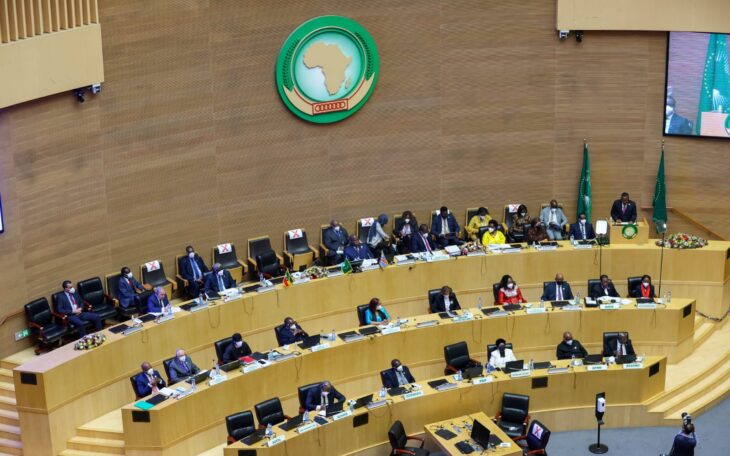ADDIS ABABA, Feb 6 (Reuters) – Leaders gathered at an African Union (AU) summit called on Saturday for the continent to have a bigger role on the international stage amid signs the bloc is struggling to forge a coordinated response to challenges from coups to COVID-19.
The AU, formed 20 years ago to foster regional cooperation, has taken little decisive action in the face of six coups or attempted coups in Africa over the past 18 months, and the power grabs were high on the summit agenda.
While the bloc did move to suspend Burkina Faso, Mali and Sudan following military takeovers, it is unclear whether the ban has had any effect on the countries’ new leaders.
AU Commission Chair Moussa Faki Mahamat told leaders at the opening ceremony that the security situation in Africa required the bloc to take a new approach and called for “more active inter-African solidarity”.
Differences between members over the bloc’s relationship with Israel broke into the open at the ceremony.
Faki defended his decision last year to unilaterally accept Israel’s request for observer status at the AU, a step that bolsters Israeli ties with the organisation.
South Africa, where the ruling party strongly backs the Palestinian cause, has criticised that move.
Along with Nigeria, Algeria and a Southern African regional bloc, South Africa is pushing for Israel’s status to be revoked, according to an internal memo prepared for the summit and seen by Reuters.
The Democratic Republic of Congo, Morocco and several other countries support Israel’s presence, one African diplomat said.
Palestinian Prime Minister Mohammad Shtayyeh, who spoke at Saturday’s ceremony, called for Israel’s observer status to be withdrawn.
“It is actually a reward that encourages Israel to continue violating international treaties,” he said.
ETHIOPIAN WAR, COVID
Some observers fear the Israel dispute is shifting attention from pressing issues like the conflict in Ethiopia and unrest in Sudan following a coup in October.
“It’s been difficult to discuss Ethiopia at the AU level over the last 15 months, let alone have a discussion that is meaningful on issues of state-sponsored abuses, protection and justice,” said Caribe Kaneza Nantulya, Africa advocacy director at New York-based Human Rights Watch.
U.N. Secretary-General Antonio Guterres addressed the leaders by video link and repeated calls for a ceasefire in the Ethiopian conflict, which broke out in November 2020 and has killed thousands.
Ethiopian Prime Minister Abiy Ahmed used his speech to call for a permanent seat for Africa on the U.N. Security Council and urged the AU to form a continental media house to counter “negative media representation of Africa”.
The AU’s efforts to combat the pandemic are also on the summit agenda.
After wealthy countries hoarded COVID-19 vaccines for months last year, African nations finally began receiving larger supplies by November. But the region is far behind global vaccination targets, partly due to logistical challenges.
Governments hope the creation of a continent-wide drug regulator, the African Medicines Agency (AMA), last year might help Africa combat inequities with other regions.
Want to send us a story? Contact Shahidi News Tel: +254115512797 (Mobile & WhatsApp)


